FOCUS ON THE PROTESTS
Many thousands of Georgians are joined by the international community in condemning the government's foreign agents bill PAGE 2,3,4

Professor Charles H. Fairbanks, Jr.: Georgia’s Only Hope to Keep Its Sovereignty Is Democracy
Professor Charles H. Fairbanks, Jr. has been living in Tbilisi since 2006, where he works as Professor of Soviet and Post-Soviet systems at Ilia State University. Fairbanks is a senior fellow at the Hudson Institute and previously served as a research professor of international relations and the director of the Central Asia-Caucasus Institute at Johns Hopkins University’s School of Advanced International Studies. He served as a deputy assistant secretary in the U.S. Department of State and a member of the department’s policy planning staff. Fairbanks has also taught on the political science faculty of both Yale University and the University of Toronto. Radio Free Europe/RL’s Georgian Service sat down with him this week to discuss Georgia’s shaky trajectory westwards, and the big personalities involved on the way.

In this week’s issue...
Ukraine Latest: Chemical Warfare and Lack of Weapons Hamper Ukraine’s Success
Georgian President Prepares to Veto the “Russian Law”
Western Condemnation Continues to Flow against Georgian Dream’s Foreign Agents Bill
From Batumi to Tbilisi: Ad Black Sea Launches FirstEver Tbilisi Design Festival
Procedures for Registration as a Payment Service Provider in Georgia
Georgia is an Easy Place to Rent/Own Cars
Killages – A Georgian Band All Set for International Success



PreparedforGeorgiaTodayBusinessby Issue no: 1446 • • APRIL 19 - 25, 2024 • • PUBLISHED WEEKLY
PRICE: GEL 2.50
BUSINESS
POLITICS PAGE
NEWS PAGE 2 NEWS PAGE 3 CULTURE PAGE 11 BUSINESS PAGE
BUSINESS PAGE 7
on page
BY VAZHA TAVBERIDZE
PAGE 8
4
9
Continued
5 INTERVIEW
The Tbilisi protest, day 3. Photo by Vano Shlamov, AFP
Thousands gathered in front of parliament on the third night of protest. Source: Formula
Ukraine Latest: Chemical Warfare and Lack of Weapons Hamper Ukraine’s Success
COMPILED BY ANA DUMBADZE
As the war enters its 784th day, at least 17 people were killed in the Ukrainian city of Chernihiv after it was struck by three Russian missiles. Emergency services said 60 people, including three children, were injured. About 250,000 people live in Chernihiv, which is 150km north of the capital, Kyiv.
A woman was injured by falling debris after Russian forces brought down a done over the Voronezh region. Governor Vyacheslav Gladkov said air defense also destroyed 14 airborne targets over the southern Belgorod region. No injuries were reported.
Ukrainian President Volodymyr Zelensky said the Ukrainian military had attacked a large Russian airfield at Dzhankoi in the north of occupied Crimea. A series of explosions were reported at the base. There were no reports of damage.
The BBC reports that the number of Russian soldiers killed in the war in Ukraine has topped 50,000. The data was compiled by BBC Russian, independent media group Mediazona and volunteers.
ILLEGAL CHEMICAL WARFARE ONGOING
Colonel Serhii Pakhomov, acting head of the Ukrainian military’s atomic, biological and chemical defense forces, told

the Reuters news agency that Kyiv had recorded about 900 uses of riot control agents on the front line by Russia in the past six months. The gases, banned for use on the battlefield by the international Chemical Weapons Convention, are

Georgian Footballers Protest ‘Foreign
Influence’ Bill
Leading players in Georgia’s national men’s football team have backed mass protests sparked by a “foreign influence” bill criticized for mirroring a repressive Russian law, The Guardian reports.
Riot police have clashed in recent nights with large rallies of people protesting outside the parliament building in Tbilisi against the bill, which is viewed in Brussels as a threat to future EU membership.
Jaba Kankava, the captain of Georgia’s national football team, which recently qualified for Euro 2024, its first major tournament, posted a picture on Instagram of two protesters staring down riot police on Tuesday night, adding: “Fuck Russia.”
A host of other national team players, including Khvicha Kvaratskhelia, a winger for Italy’s Serie A club Napoli, and Giorgi Mamardashvili, who is a goalkeeper for
Valencia in Spain’s La Liga, also posted what appeared to be coordinated messages on social media.
They wrote: “Georgia’s path is to Europe. The European way unites us!! Forward to Europe!! Peace to Georgia.”
Despite the protests, 83 out of 150 deputies voted in favor of the bill on Wednesday, which must pass two more readings before becoming law. The ruling Georgian Dream party says the legislation is needed to promote transparency and combat “pseudo-liberal values” imposed from abroad.
Georgia’s prime minister, Irakli Kobakhidze, said he would not back down.
He said: “As for the West, the opposition talked about this as if we consider the West as an enemy. I will repeat once again that transparency is not a criterion for distinguishing between enemies and friends.
First of all, of course, a friend should be transparent, this is the friends’ responsibility before the Georgian public.”
being used to try and clear trenches, Pakhomov said. Some 500 troops had required medical help after exposure to toxic substances on the battlefield, and at least one soldier died after suffocating on tear gas, he added.
POLITICS AND DIPLOMACY
US House Speaker Mike Johnson said the House would hold a long-delayed vote on a $60bn aid package for Ukraine on Saturday. The bill, passed by the Senate in February, has been held up amid
objections from far-right members of Johnson’s Republican party. Writing in the Wall Street Journal, US President Joe Biden urged Congress to approve the package, saying the conflict was at a “pivotal moment”.
China said that “a lot of work” would need to be done before a planned peace conference on the Ukraine war could take place in Switzerland. It did not say whether it would attend the meeting, which is expected to take place in June.
ZELENSKY BEGS FOR MORE WEAPONS
President Zelensky, addressing the European Council by videolink hours after the Chernihiv attack, pleaded for more defense systems. Zelensky said Ukraine should enjoy the same cover from aerial attacks as Israel, which was able to intercept a barrage of drones and missiles fired by Iran last weekend. “Our Ukrainian sky, the sky of our neighbors, deserves the same level of defense,” he said. “All lives are equally valuable.”
German Chancellor Olaf Scholz and other senior German officials pressed fellow European Union members to take action as soon as possible to boost Ukraine’s air defenses. On Saturday, Germany announced it was sending an additional Patriot air defense system to Ukraine.
NATO chief Jens Stoltenberg said the NATO-Ukraine Council will meet on Friday to discuss ways to provide more air defense systems for Kyiv.
Aleko Elisashvili: Police Beat Me, My Rib is Broken
BY ANA DUMBADZE
MP Aleko Elisashvili, the leader of the Citizens party, claims that he is “well beaten” and has a fractured rib.
Elisashvili referred to the events that took place at the rally held Wednesday night near the government administration. “We had “constructive clashes” with the police. At that time, I ran into the head of the patrol police, Vazha Siradze, and under his direct guidance, several policemen dragged me to the office. During this fight, I fell down and they started to kick me. After such a “good” beating, I met Anzor Chubinidze and had a fierce conversation with him. After that, they put me and one of the arrested protesters in the car, and finally they took us to the Tsereteli Police Department. I was there for several hours. Then Levan
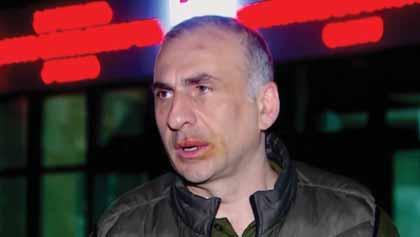
Ioseliani (the Public Defender) also came and we left. Then I went to the clinic because my whole body hurt. I have such a swollen lip that I joked that I am the Chinese version of Angelina Jolie, and I have a broken rib. Now I’m at home, I feel relentless, and in any case, no to the Russian law,” said Elisashvili.
At the session of the legal committee on April 15, Elisashvili physically confronted the leader of the parliamentary majority, Mamuka Mdinaradze. Elisashvili punched Mdinaradze on the head as he presented the draft law “On the transparency of foreign influence” to the deputies, calling him “Russian”.
Georgian Police Clear Protesters Against Foreign Agent Bill
Riot police in Georgia waded into demonstrators and cleared them from around part of the ex-Soviet state’s parliament on Tuesday night as lawmakers debated a bill on “foreign agents” that the opposition denounces as authoritarian, REUTERS reports. The edition says the bill would require organizations receiving more than 20% of their funding from abroad to register as being agents of foreign influence. It is likely to pass in a parliament controlled by the
ruling Georgian Dream party and its allies. “Opponents say the legislation will damage Georgia’s bid to join the European Union.
“As many as 10,000 protesters massed outside parliament, a larger gathering than the previous day, to denounce the bill, approved by a parliamentary committee on Monday.
“Officers, some carrying shotguns, ordered protesters to disperse and deployed what appeared to be a crowdcontrol substance like pepper spray while
clashing with demonstrators.
“Protesters fled the area and within minutes the rear of the building was cleared of demonstrators, though many remained through the evening on other approaches to the parliament.
“Those forced out by police regrouped with other protesters massed on Rustaveli Avenue, a city artery,” reads the article.
Georgia’s Interior Ministry said one police officer was injured in the fracas. Eleven protesters were detained, up on the 13 from Monday night’s protest.
GEORGIA TODAY APRIL 19 - 25, 2024 2 NEWS
Rescue workers at the site of Wednesday's missile attack on Chernihiv. Photo by Genya Savilov/AFP
Georgian President Prepares to Veto the “Russian Law”
BY TEAM GT
On Wednesday, Georgian MPs adopted the draft law "On transparency of foreign influence" in the first reading, with 83 votes. The voting on the draft law was preceded by three days of dramatic and emotion-fueled committee and session discussions.
The draft law, initiated for the second time by the Georgian Dream faction, envisages the registration of non-entrepreneurial (non-commercial) legal entities and media outlets whose incomemore than 20% - is received from abroad as an organization “carrying out the interests of a foreign power.” According to the project, everyone who is considered an "organization carrying out the interests of a foreign power" must be registered in the public register under the same name in a mandatory manner. At the time of registration, it will be necessary to reflect the income received. At the same time, the organizations will have the obligation to fill out an annual financial declaration.
"We will fight to the end!", "Russians!", "Slaves!" participants of the rally against the “Russian Law,” gathered at the back entrance of parliament thus responded the adoption of the draft law in the first reading. In addition, they announced a third night of rallying around the building. The country’s president, Salome Zurabishvili, has vocally and openly condemned adoption of the law: “On one

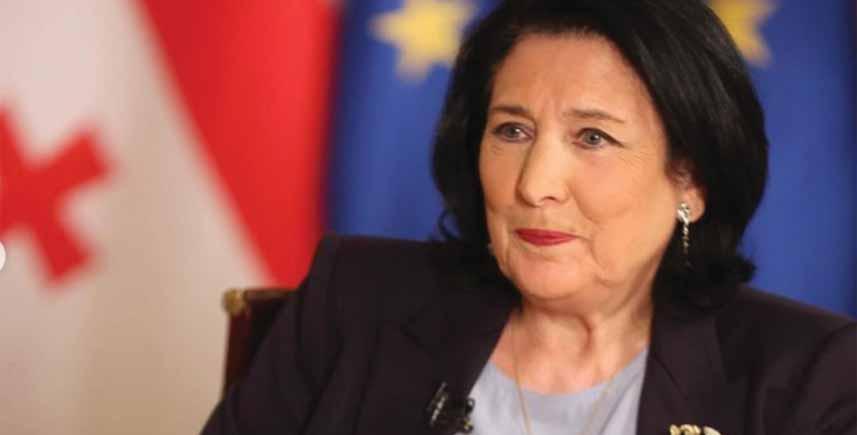
side are the people of Georgia, on the other 83 MPs who voted against our European future. The people always win!” she said. “Their insistence to push through this law against the will of the population, and despite our partners’ protests, is a direct provocation - a Rus-
sian strategy of destabilization.”
“It is clear that 80% of the population supports Georgia's European future, European integration, and Euro-Atlantic integration, and has done so for the last 30 years. Whoever goes against the will of the Georgian people does not repre-
sent the Georgian will, Georgian independence, but something else,” Zurabishvili noted this week.
“All our European and American partners say that [the foreign influence law] will be a hindrance to our European path. I will definitely veto the law. My veto is
the voice of the people. Because it's not just this, it's the whole strategy that goes against the EU recommendations. Yes, my veto will be overridden in parliament, where the majority can do so. But my veto is the voice of the people, and this voice will be heard loud and clear.”

GEORGIA TODAY APRIL 19 - 25, 2024 3 NEWS
President Zurabishvili. Source: IG
Western Condemnation Continues to Flow against Georgian Dream’s Foreign Agents Bill
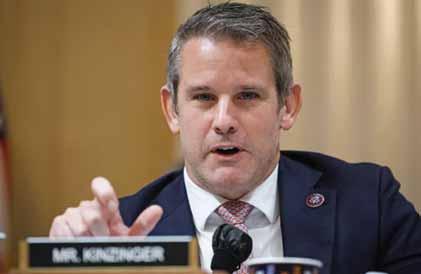 BY TEAM
BY TEAM
This law, if adopted, will not help Georgia to get closer to the European Union,EU ambassador to Georgia, Paweł Herczynski, said after his meeting with President Salome Zurabishvili on Wednesday.
"The EU reacted very quickly to the introduction of the draft law. Within 24 hours, on April 4, the spokesperson of the EU High Representative for Foreign

Policy and Security issued a statement. Yesterday evening, the President of the European Council, Charles Michel, stated his position, and I think his position is loud and clear. This law, if adopted, will not help Georgia get closer to the European Union; on the contrary, it will cause complications, because this law clearly does not comply with the norms and values of the European Union.
"President Salome Zurabishvili invited
The proposed legislation may limit the freedom of civil society and media organizations to work freely
all EU ambassadors, as well as representatives of the USA and Great Britain to the meeting, where she shared her concerns regarding the draft law on the transparency of foreign influence," Herczynski said.
EU High Representative Josep Borrell and EU Commissioner for Neighborhood Policy and Enlargement Olivér Várhelyi: “Georgia has an active civil society that contributes to the country's successful progress towards EU membership. The proposed legislation may limit the freedom of civil society and media organizations to work freely, as well as freedom of expression and unfairly stigmatize organizations that benefit Georgian citizens. The European Union calls on Georgia to refrain from adopting such legislation that might compromise Georgia's path to the European Union - a path supported by the vast majority of Georgian citizens.”
Charles Michel, President of the European Council: “The Georgian people have chosen the European path, and in response, the European Council granted
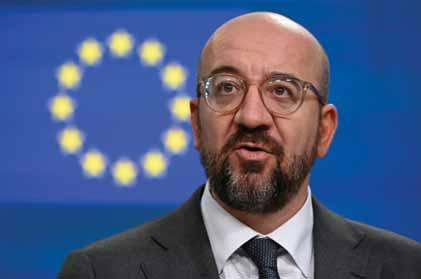
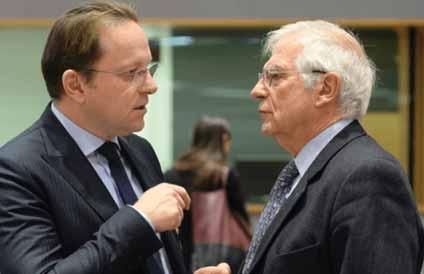
Georgia the candidate status last December. Let me be clear: The draft Law on Transparency of Foreign Influence is not consistent with Georgia’s EU aspiration and its accession trajectory and will bring Georgia further away from the EU and not closer.”
Spokesperson for the US Department of State, Matthew Miller: “We remain deeply concerned that this draft legislation would harm civil society organizations working to improve the lives of Georgian citizens and would derail Georgia from its European path. We are also concerned that this draft legislation would impede independent media organ-

izations working to provide access for Georgian citizens to high-quality information. But as this remains draft legislation at present, I’m going to leave it there and not talk about any implications should it actually be passed into law.”
Viola Von Cramon: “The EU Parliament's position on the Georgian Dream's Russian law is very clear: It jeopardizes Georgia's EU future and EU candidacy. We stated this in the letter 10 days ago,
we will state it in the EU Resolutions. The draft law only serves the Oligarch and his handlers in the Kremlin.”
MEP Anna Fotyga: “Georgians are well aware that the real threats to their country do not come from the West, but from another particular direction. It is clear why so many are standing against the 'foreign agents' bill, which is not intended to counter the growing Russian influence in the country. I still hope that the government will refrain from taking steps that may derail the country from its Euro-Atlantic path.
Adam Kinzinger, former US politician: “Today, Georgia continues its struggle for freedom against Moscow's puppet government. We stand by the Georgian people.”
European Parliamentarian Petras Austrevicius: “Something is fundamentally wrong within the Georgia Dream ranks, otherwise this country is about ‘Back to USSR.’ Spreading fake news and disinformation is not bringing Georgia close to the EU.”
Claude Kern (France, ALDE) and Edite Estrela (Portugal, SOC): “The reintroduction of this so-called Foreign Agents Law, whose withdrawal last year we warmly welcomed, is of deep concern. What we said the first time this law was
The draft law will bring Georgia further away from the EU and not closer
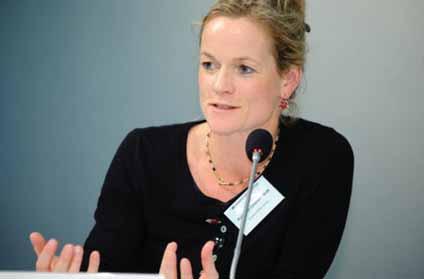
Georgians know the real threat to their comescountry not from the West, but from another direction
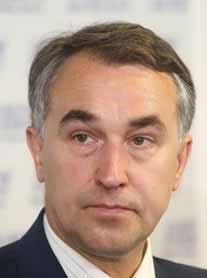
Petras Austrevicius. Source: Delfi
introduced remains valid for this proposal: there are serious questions about the draft law's compatibility with European democratic and human rights standards and norms. We therefore urge the authorities to withdraw this draft from the parliamentary agenda.”
MEP Michael Galler: “When you watch the demonstrations in Georgia against the ‘foreign agents’ law, which copies the widely repressive Russian legisla-
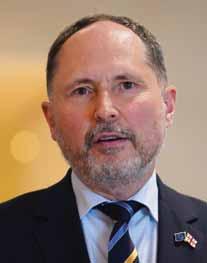
Paweł Herczynski. Source: Civil.ge
tion, you get the impression that the real ‘agents’ of foreign interests are in the ruling party, and not in targeted nongovernmental organizations.”
Boris Akunin (Grigori Chkhartishvili), writer: “We should be afraid not of political opposition, but of Putinism. Let us be afraid of an invasion not only from the outside, but from the inside. That's what's happening now. Putinism is trying to nest in your homes - at the initiative of your own government. It will eat at Georgia like cancer. First, "foreign agents", then "fifth column", then "terrorists and extremists", and then Georgia will have no other friends except Putin's Russia.”
GEORGIA TODAY APRIL 19 - 25, 2024 4
POLITICS
GT
Adam Kinzinger. Photo by Chip Somodevilla/Getty
Anna Fotyga. Source: EP Charles Michel. Photo by John Thys/AFP via Getty Images
Olivér Várhelyi and Josep Borrell. Source: euronews
Matthew Miller. Source: Alpha News
Viola Von Cramon. Source: Wikipedia
Professor Charles H. Fairbanks, Jr.: Georgia’s Only Hope to Keep Its Sovereignty Is Democracy
Continued from page 1
HOW WOULD YOU ASSESS THE SITUATION GEORGIA FINDS ITSELF IN TODAY, BOTH POLITICALLY AND DOMESTICALLY?
Internationally, Georgia, which once was moving slowly, and with interruptions, but continuously towards Europe, seems to be drifting somewhere between Europe and Russia. And domestically an important election is about to happen, which will test the survival of democracy in Georgia. These are trying times for the country.
IN AN INTERVIEW SOME SEVEN YEARS AGO, YOU SAID GEORGIA’S WESTERN DIRECTION HAD TREMENDOUS MOMENTUM. WHAT DO YOU THINK WENT WRONG?
I think it's a general problem for most post-communist governments, except the Baltics, that the governments don't want to give up power. They are very tempted towards the abolition of democracy after they have ruled for a time, and democracy gradually becomes less and less appealing to them. And that is now true of Georgia too.
WE NEED TO ASK YOU ABOUT THIS HOTLY-DEBATED “FOREIGN AGENTS” LAW THAT THE GOVERNMENT IS TRYING TO PASS. WHAT’S YOUR TAKE ON IT?
This law that the Georgian government wants to pass has tremendously destructive potential. And it's important to this debate, I think, to say that when the American law was passed by Congress, the obvious cause of the law was the rise of totalitarianism in Europe, first Soviet communism, then Italian fascism, then German fascism. The American foreign agents’ registration law was meant to deal with that problem. So, to use that analogy today with the Georgian law is just wrong. There is also a very key dif-
Both the UNM and Georgian Dream governments were democratic, but they both decayed
ference between the American law and the Georgian law, which is that the Georgian law explicitly includes the media, newspapers, television, even the internet, if it's in the Georgian language, whereas the media was never included in the American foreign agents’ registration law, if it was at least 80% Americanowned.
WE LAST SPOKE A YEAR AFTER THE 2012 GOVERNMENTAL CHANGE. YOU SAID IT WAS BEING DECIDED WHETHER GEORGIA HAD MANAGED TO BECOME A CONSOLIDATED DEMOCRACY, AND WHETHER IT WAS READY TO LEARN FROM ITS MISTAKES. DID IT?
Well, I think originally, it did. Both the UNM government and the Georgian Dream government were, broadly speaking, democratic. But they both decayed. And the degree of control that citizens had over their government was so limited that the loss of democracy in the old age of those two governments couldn't easily be controlled by the public. And that's the situation we're facing now.
YOU SAY WE ARE BRACING FOR CRUCIAL ELECTIONS. IN 2016, YOU PREDICTED GEORGIAN DREAM WOULD BE IN TROUBLE WHEN IT CAME TO THE ELECTIONS.
DO YOU STILL THINK SO?
Yes, and it's true of any government. I was an American government official, for roughly four runs, four steps up the ladder below the president. And I noticed it in the second term of the Reagan administration: It was worn out and lacked any vigor or sense of direction. And I think that has happened to Georgian Dream as well- its officials are tired and there's a lack of clear direction now. But what is clear is the personal interests of people who don’t want to lose power and the access that gives them to money.
YOU OFTEN LAMENT THE FACT THAT GEORGIA HAS FAILED TO HAVE GENUINELY PARTY-DRIVEN POLITICS, THAT IT IS STILL ALL ABOUT PERSONALITIES. YOU SAID PRESIDENT MARGVELASHVILI WAS LIKE ICARUS, TRYING TO FLY WITH WINGS NOT OF HIS OWN MAKING.
WHAT DO YOU SAY OF OUR CURRENT PRESIDENT?
She was essentially chosen by Bidzina Ivanishvili. She didn’t have a political position that would have brought her to the presidency without him. But I think she was genuinely shocked by the turn away from Europe, because she is both a Georgian and a European by the complexity of history, which made her ancestors flee to France. And so I think her
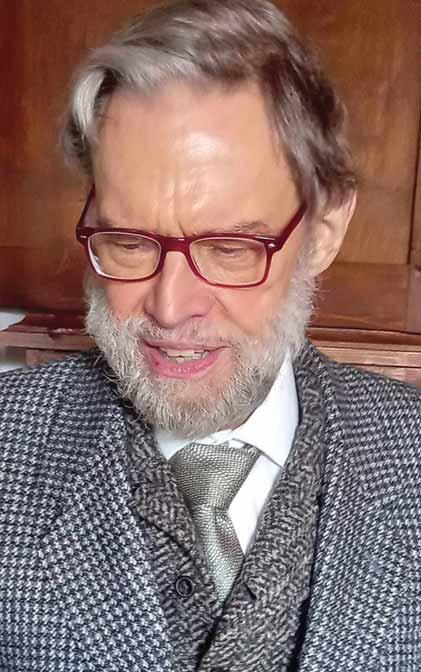
rebellion against Georgian Dream is a natural one, and to be expected.
YOU TOLD ME IVANISHVILI SHOWED NO SIGNS OF WANTING TO CLING TO POWER AND RULE FROM BEHIND THE SCENES AFTER HE RESIGNED FROM BEING PRIME MINISTER THE FIRST TIME. HAS YOUR VIEW OF HIM CHANGED?
It has. He clearly wants to continue being the ultimate source of authority in the Georgian government. He doesn't want to administer the country day to day, the way Vladimir Putin does, he’s certainly not a tyrant in that sense. One of the problems with the Georgian government today is that decisions are made very slowly, because Ivanishvili isn't following the government's activities day to day: He just suddenly inter-
USAID Supports Georgia’s Journey Toward a More Secure Energy Future

venes on important issues, but these often lack a context that would make them sensible.
AS A SCHOLAR OF STATECRAFT, HOW WOULD YOU CHARACTERIZE THAT KIND OF RULERSHIP? IS IT STILL DEMOCRACY?
I would say it's a democracy in which the sovereignty of the people is diluted or weak. There are many people who still revere and support Ivanishvili, who are not necessarily anti-democratic, but as his period of domination in Georgian politics grows old, it's a big question how to continue with it in a democratic way. The anti-Western tone is very threatening to democracy, because the prestige of the West is still very important support for the degree of democracy that Georgia has. And from that perspective,
The President's rebellion against Georgian Dream is a natural one
I see the Georgian law on transparency of foreign agents as a huge threat to democracy.
YOU TOLD ME IN 2013
THAT MIKHEIL SAAKASHVILI WAS “A TRAGIC FIGURE, A PRISONER OF A TRAP OF HIS OWN MAKING”. NOW HE’S QUITE LITERALLY A PRISONER.
WHAT'S YOUR TAKE ON THE FATE THAT HAS BEFALLEN HIM?
Well, it's very sad. I think he was the real hero in Georgian history for a while, but, unfortunately, he really did things as president that were illegal, and that certainly were shocking, like the treatment of Girgvliani. Even in Western democracies, we don't quite know how to deal with that kind of situation. Richard Nixon was the popular president, who, in a free election beat an unpopular president, but who also broke the law. How to handle that is a problem. It’s a problem now with ex-President Trump.
IN 2013, YOU ACCURATELY PREDICTED GEORGIA’S FATE FOR THE FOLLOWING DECADE.
HOW DO YOU SEE THE NEXT DECADE FOR GEORGIA?
Well, I think there are very contrary tendencies. Ever since Sulkhan-Saba Orbeliani took ship for Rome and Paris, there has been a very powerful Georgian attraction to Europe. And it still dominates in the feelings of the majority of Georgians, though not all Georgians. On the other hand, the way Georgian Dream is now changing in the context of the war with Ukraine is very, very dangerous to the sovereignty and freedom of Georgia. If Putin really wins the Ukraine war in the sense of being able to annex a substantial part of Ukraine, and to create instability in Kyiv to a degree that Ukraine can't any longer seize independence, I don't see how Georgia can prevent being sucked into the position of Belarus or Tajikistan, which are nominally independent countries, but which depend on Russia on crucial issues; where what Russia says, goes, even if they don't want to. There is a real danger of the loss of Georgia’s sovereignty. And I believe it can be maintained only by democracy.
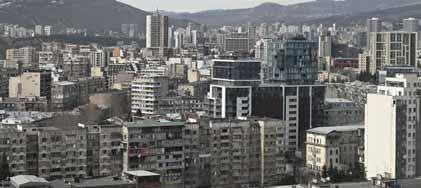
GEORGIA TODAY APRIL 19 - 25, 2024 5
POLITICS
UNDP Georgia launches new project to improve air quality and safeguard public health across Georgia With funding from European Union in Georgia, UNDP Georgia is launching a new project to improve air quality and safeguard public health across Georgia. UNDP
The ambitious goals include strengthening the air quality surveillance network and enhancing air quality monitoring, modelling, and forecasting capacities. The project will also assist Georgia in establishing a national reference laboratory and implementing efficient strategies to regulate industrial emissions in alignment with international practice.
SAID supports Georgia’s journey toward a more secure energy future As USAID Georgia stated, USAID supports Georgia’s journey toward a more secure energy future with the installation of the country’s first-ever floating solar plant in the village of Lemshveniera in Gardabani region. The plant will generate 300,000 kWh each year to irrigate nearby fruit orchards, harnessing renewable energy to create economic growth. This is one of several USAID-supported renewable energy projects in Georgia.
BUSINESS
Georgia Launches New Project to Improve Air Quality and Safeguard Public Health Across Georgia
U
Professor Charles H. Fairbanks, Jr.
16 Years of ADB-Georgia Partnership – Driving Sustainable Development for Georgia’s Future. Part 1
BY KATIE RUTH DAVIES
At the beginning of April, the Asian Development Bank (ADB) held a media tour for Georgia-based journalists ahead of the ADB Annual Meeting to be held in Tbilisi on 2-5 May 2024.
Since 2007, ADB has supported Georgia through sovereign and private sector investments, policy reforms, capacity building, and knowledge. This is helping Georgia achieve sustainable development, transition to a green and integrated economy, foster a more resilient and inclusive society, and develop into a regional trade and logistics gateway.
ADB is one of Georgia’s largest multilateral development partners. As of 31 December 2023, ADB had committed 86 public sector loans, grants, and technical assistance to Georgia, totaling $4 billion.
“Our portfolio is divided roughly 50-50 between our sovereign operations –working with the government, and our private sector operations,” Lesley Bearman Lahm, Country Director of the ADB Georgia Resident Mission, tells us. “Our overarching objective is to support Georgia’s transition and trajectory and continued progress towards a green and integrated economy that supports a resilient and inclusive society, and the projects we will see on this media tour work towards achieving these objectives: Projects that improve connectivity, improve the quality of life in cities and rural areas, open up economic opportunities, as well as help the private sector go green.”
“Georgia has one of the most dynamic private sectors in the region, and is in a unique position between Europe and Asia,” David Urbaneja-Furelos, Unit Head, ADB Private Sector Operations, notes. “ADB is ramping up operations to cover multiple sectors– energy, water utilities, transport, telecoms, agribusiness and health and education. ADB is considered the ‘climate bank’ for Asia and the Pacific. The projects we implement are primarily transactions that are climate-focused, or geared towards capital market development: Putting together our sovereign operations with a capital market development strategy with the Government of Georgia, and helping issuers to access them.”
INVESTING IN ‘GEORGIA CAPITAL’ TO SUPPORT RENEWABLE ENERGY, EDUCATION, AND CORPORATE SUSTAINABILITY
In August 2023, ADB and JSC Georgia Capital (GCAP) partnered to issue GCAP’s inaugural sustainability-linked bond. ADB agreed to invest $16 million, with the proceeds earmarked for refinancing renewable energy and education investments, and for financing corporate measures to achieve the group’s sustainability-linked key performance indicator. GCAP is one of the largest private investment companies in Georgia, with investments in banking and insurance, healthcare, renewable energy, water utility services, education, and housing and hospitality.
“Until four-five years ago, capital markets in Georgia were very limited, with a maximum size of 20-25 million. We were the first in the country to issue the largest bond at that time, and the first listed in the stock exchange in terms of a green bond,” said Giorgi Alpaidze, CFO at Georgia Capital.
“We’re very proud to have, in Georgia, a lot of ‘first of a kind’ transactions,” Urbaneja-Furelos says. “It is really helping Georgia, despite the small size of the economy, to have a real niche, and to show that, together with the help of the government, IFIs and private sector players, Georgia really is on a different path, something also shown in December when Georgia was granted EU candidate status.”
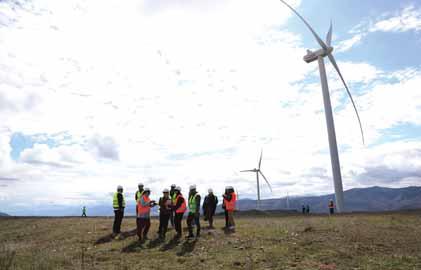
INVESTMENT IN TEGETA GREEN BOND TO EXPAND ELECTRIC VEHICLES AND CHARGING NETWORKS IN GEORGIA
In July 2023, ADB invested 20 million lari (around $7.6 million) in Tegeta Motors’ inaugural 2-year and 6-month Laridenominated green bond, the first-ever such issuance on the Georgian Stock Exchange.
The proceeds financed the deployment of zero-emission light, road, and nonroad electric vehicles, and an expansion of Georgia’s EV charging network by 70 new stations.
Tegeta is a Georgian automotive company with over 400,000 registered retail, 40,000 corporate-, and 3,000 wholesaler clients through 28 service centers across the country.
“Tegeta is dedicated to pioneering the issuance of Lari-denominated green bonds to support Georgia’s efforts to reduce greenhouse gas emissions and transition toward a more sustainable transport sector,” Tegeta Executive Director Vakhtang Kacharava said at the time. “This issuance reaffirms our commitment to environmental responsibility and sustainability, and actively contributes toward a climate-friendly future.
“The more the economy develops, the more exchange rate fluctuations bring risks to our portfolios, so we really need to diversify them, and thus we encourage domestic capital market development,” says Ekaterine Guntsadze, Georgian Deputy Minister of Finance. “Hearing from the private sector that domestic borrowing and green loans are already in practice brings a lot of motivation and shows progress in private sector development. It is always welcome when the private sector takes over sovereign portfolios, when we see the projects being built through the support we are getting from the IFIs, and the expertise those projects bring and the money it puts into the country’s budget – this is why we are trying to have the fiscal space available so that we can borrow for such projects.”
INVESTMENT IN GEORGIAN RENEWABLE POWER OPERATIONS (GRPO)
GREEN BOND
In October 2022, ADB invested $4 million in a green bond issued by Georgian Renewable Power Operations (GRPO), which is using the funds to support its ongoing operations.
GRPO operates five renewable power projects, including four hydropower plants with a total installed capacity of 50.4 megawatts and Georgia’s only wind power plant.
ADB’s investment forms part of an $80 million issue by GRPO of a 5-year green bond, Georgia’s first domestically-listed green bond and the largest bond listed on the Georgian Stock Exchange. ADB will also administer a $4 million subscription to the bond by Leading Asia’s Private Infrastructure Fund.
“In 2022, we made an exceptional transaction, a bond we issued on the local capital market, one which was the first ever green bond in Georgia, the largest corporate transaction of the time,” Nuka
renewable energy. It’s a pity that the pace of growth is slower than it could be. We could export, generate energy as an economical resource. Not every country can say it’s so lucky.”
Looking ahead, Mshvidobadze tell us there is a 320 MW medium-sized HPP in Svaneti in the pipeline, and two more windfarms – one in Kaspi, the other nearer Tbilisi, with a current estimated completion date of 2026-27.
The Gori windfarm has 6 turbines, 3.4 MW each, 20.6 MW circa installed capacity in total. This, at full capacity, provides electricity to around 50,000 households via the national grid.
As part of the media tour, we were taken to two of Kutaisi’s underground reservoirs.
“Water is pulled up via pumps to the first reservoir, where it undergoes chlorination. It then goes into the distribution network and holding reservoirs or tanks, and from there, is gravity-fed to supply the whole city of Kutaisi,” Murman Katsitadze, Kutaisi Water Project Officer, ADB, explains.
Mshvidobadze, Georgian Renewable Power Operations (GRPO) CFO, tells GEORGIA TODAY. “It resulted in unprecedented interest from international investors. We have four international institutions present in our obligations – FMO, IFC, EBRD and ADB. ADB acted as an anchor in this transaction, and without their long-term trust and support, it would have been very hard to make it work. ADB’s presence in the country and growing office means they see things differently and already have very good knowledge of the local laws and development issues. This boosts us in our development, in our environmental and social, governance, finance and technical standards. When they are by our side, we know we’re working to a high level,” she adds.
Mshvidobadze informs us that Georgia has 1000-1500 MW in capacity for windfarms to be built, and a current 30% deficit, though there is great future potential to make up this deficit through both wind and hydro plants.
“Georgia can be self-sufficient. It would certainly be good for Georgia in terms of energy security,” she says. “Right now, we are increasing imports of electricity and gas from Azerbaijan and Russia. Georgia can be an energy hub. It has amazing potential in renewable energy, and if we build the Black Sea cable, we can be exporters rather than importers.”
As to the social concerns, among them hyped-up fears of villages being flooded for the sake of hydro plants and money put in administrative pockets, Mshvidobadze says it often comes down to miscommunication and lack of education.
“Since the early 1990s, there has been huge protest against large HPPs with reservoirs, leading to the building of HPPs in Georgia being blocked. Yet some HPPs don’t require reservoirs. Awareness needs to be increased, right from school age,” she says. “We [GRPO] are among the few developers to have built a Run-of-theRiver HPP in Svaneti – a tough region to build in. With the right provision of information to the local population, and through sponsoring an annual ski tournament, we are welcomed there.”
“They also need to understand the alternative,” Urbaneja-Furelos puts in. “Do you, as a person, want to rely on other countries for your energy supply? Do you want to have more pollution in your country? They need to understand the tradeoffs.”
“Energy independence is personal to all of us in the field,” Mshvidobadze says. “We understand how much we need
The Gori turbines boast a 119m blade diameter and are 90m tall. The new projects will have bigger turbines: A 150170m blade diameter and height of 100120m, which means each farm will be able to generate up to 80 MW.
Major issues in constructing the Gori wind farm were logistical: Transporting the blades from Poti port to the site. The bottlenecks of the old Rikoti road meant they had to be brought via Chiatura. The new East-West Highway construction, once complete, will ease delivery of the bigger blades to the new sites.
Another note we were happy to hear from GRPO was that, within the framework of ADB, there is an ongoing gender awareness campaign to have more females choose the energy sphere for their future careers.
“I have personally gone to several schools presenting the career opportunities in the energy field,” Mshvidobadze tells us. “We have only around 20% share of female workers in the field. I’m the only woman on the management board! I explain to these high school graduates why the energy sector is important, why we need to work towards self-sufficiency. It’s an exciting ever-evolving sector to be in.”
IMPROVING URBAN SERVICES, WATER SUPPLY AND SANITATION SERVICES IN GEORGIAN TOWNS
Since 2011, ADB’s urban services investment program has been improving water supply and sanitation services in 13 cities of Georgia.
ADB has helped provide 24-hour water supply in the Georgian towns of Abasha, Anaklia, Poti, Ureki, Mestia, Jvari, Chiatura, Kutaisi, Zugdidi and Telavi. Works are ongoing in Gudauri, Marneuli and Bolnisi. The project in these towns included constructing a full circle of infrastructure, including reservoirs, transmission mains, water networks, as well as sewage networks and wastewater treatment plants. Works are ongoing in Poti on a wastewater system and treatment plant.
On driving through a typical street in Kutaisi, and indeed, throughout much of Georgia beyond the boundaries of the capital Tbilisi, you will see the bright blue plastic or rusted metal of the population’s family water tanks, often atop towers, peeking out above garden walls. These date from a time when drinking water was in rare supply, and one had to fill up the tank in those quick few hours of supply each day or two. Many of these tanks, at least in the cities touched by the ADB project, today stand empty – as the government, with the financial support of ADB, has set up a water supply that is (almost) 24/7, so the tanks are no longer needed.

“In the past, there was a water supply system, but it was in very poor condition. The city had from four to six hours of water supply a day, and in regular cases, not even that, and not every day. Now, the same amount of electricity is consumed, but we have 24/7 supply for the whole city, with the same expenditure.”
He says that, over time, they are replacing the old soviet pumps with a modern German brand. It takes time and money, and the system is not yet perfect – but supply is guaranteed to Kutaisi citizens for up to 10 hours even without all the pumps in operation, thanks to the massive holding reservoirs.
“They say Georgia is abundant in water, but the reality is that we need to take care of our supply. For example, here, we see the impact of climate change on the water levels, reducing supply over time,” says Mzia Giorgobiani, Deputy Minister of Regional Development and Infrastructure, highlighting a global issue affecting Georgia’s water system subscribers.
“Ultimately, we want to connect the villages around Kutaisi to these reservoirs too, and, indeed, by 2030 we want to have clean water supply systems countrywide and meters in every household,” she notes. “It takes time to prepare a project for construction. We are also challenged in finding among Georgian companies those with the needed level of experience and expertise to undertake such projects. As such, we currently need to bring in internationals, though the subcontractors are Georgian, meaning local knowledge is growing. This is all undertaken thanks to IFI financing, financing from local investment banks, the German Development Bank with EU support, from ADB, these being just a few examples. Nearly half the financing for the water company comes from the state budget, helping municipalities to cover the costs and step by step expand the system.”
Giorgobiani says that they have made changes to the policy law regarding development of the water supply system, have increased the workers’ salaries, and want to create water testing laboratories in every region.
“Sanitation is also key, and the impact on the environment of waste,” she adds.
“Until 2012, we had no modern, centralized sanitary treatment plant, and this is something we also want to expand. Zugdidi is one example of a successfully completed project. We are in the final stage of hiring a contractor to install such a plant in Kutaisi, financed by Western donors. We also want to increase the amount from the budget dedicated to clean water supply, and this will become much more realistic once the East-West Highway is completed.”
Tune in to next week’s GT to learn more about ADB’s contribution to the East-West Highway, an element in this monster puzzle of Georgia’s infrastructural advancement that is critical to the development of all these projects.
ABOUT ADB
ADB is committed to achieving a prosperous, inclusive, resilient, and sustainable Asia and the Pacific, while sustaining its efforts to eradicate extreme poverty. Established in 1966, it has 68 members—49 from the region.
In 2023, ADB committed $23.6 billion in loans, grants, equity investments, guarantees, private sector programs, and technical assistance to both the public and private sectors of its borrowing members. ADB bolstered its total support with cofinancing of $16.4 billion.
GEORGIA TODAY APRIL 19 - 25, 2024 6 BUSINESS
The Gori wind plant
The Kutaisi water treatment plant
From Batumi to Tbilisi: Ad Black Sea Launches First-Ever Tbilisi Design Festival
 BY SHELBI R. ANKIEWICZ
BY SHELBI R. ANKIEWICZ
Georgia’s Ad Black Sea Festival is launching the Tbilisi Design Festival on May 1, 2024, which will become an annual event focusing entirely on the components and creativity of the design industry.
Established in 2015, the Ad Black Sea Festival is a creativity hub for international guests, specifically those in the Caucasus region. Executive Manager
Tamar Tsintsadze has been with Ad Black Sea since it opened its doors nine years ago. She says the capital is important for making impressions on guests and showing off Georgia, so the team wanted to make Tbilisi a regular part of the festival.
“Tbilisi has a unique vibe, and for us at Ad Black Sea, it's not just an advertising festival, but somehow a tool to invite these great professionals from around the world and show off our country,”
Tsintsadze tells GEORGIA TODAY.
As Ad Black Sea grew over the years, she says the team thought it was best to expand their platform and dedicate another festival completely to design, since it is a large industry that also encompasses the creativity and advertising fields.
The Tbilisi Design Festival will be in the same style as Ad Black Sea, featuring guest speakers, interviews, various activities, and more. However, since it is focused on design, Tsintsadze tells us this year's topics will cover communication design, print, illustration, user experience design, graphic design, and a broad understanding of the concept. As this festival continues and grows into a larger event, she explains that other design concepts will be integrated, including interior design and architecture.
“Everybody, especially in Georgia, is looking forward to this very important date,” Tsintsadze says. “Some people even call it the ‘new year of our industry,’ they are so excited about it.”
What most people waiting in anticipation for with this upcoming festival, she notes, is guest speaker Stefan Sagmeister.
An Austrian native and New York resident who has won nearly every major design reward, among them two Grammys, who has been a TED speaker too many times to count, and is an author, Sagmeister will be delivering the keynote speech at the first-ever Tbilisi Design Festival and presenting his recently published book, ‘Now is Better,’ in partner-
The annual Ad Black Sea festival in Batumi is three days long, and focuses on advertising and marketing, while taking inspiration from other fields such as literature and film. Tsintsadze explains that the festival consists of multiple parts, including panel speakers, workshops, masterclasses, evening parties, and more.

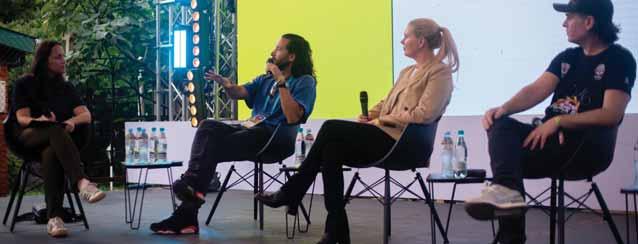
ship with the newly opened Design Institute.
According to Tsintsadze, although Sagmeister wrote the book, it is not designoriented. Rather, it shows his philosophical and optimistic view of the world, with his perspective of long-term thinking. Tsintsadze said he has this concept that everyone thinks what is happening in the world is bad, but if people changed their perspectives and thought about the long term, they would realize that what’s happening now isn’t actually so bad.
“Stefan is someone we’ve been dreaming of bringing to our festival since the first year we were founded as Ad Black Sea. He’s always been at the top of our list,” Tsintsadze says. “He’s also very excited to come to Georgia because he’s always wanted to visit our country.”
The team chose a program idea and picked the selected speakers based on the theme. This year the theme will revolve around “behind-the-scenes” of design and the steps of the creative pro-
cess rather than the end product. Tsintsadze explains that the interviews with guest speakers will focus on diving deeper into this topic by asking about obstacles they face during the creative process, how they start creating designs, and more.
The event will be held at TEC, an old factory in Chugureti, an old district of Tbilisi. The venue has no infrastructure, so the team will create everything from scratch. Tsintsadze said the one-day event will also include a tour of the city led by a local guide, who will explain the buildings, facades, street yards, history of the district, and how governmental decisions over the years have affected the current architecture.
Hosting guests from Kazakhstan, Azerbaijan, Bulgaria, Armenia, Ukraine, and other countries, Ad Black Sea hopes to present more big-named speakers in the coming years. Since the festival was always held in Batumi, Tsintsadze said it was hard to invite guests from faraway
countries because they would have to book flights and often take various connections to get to the venue. They hope the Tbilisi Design Festival will assist in this area, so everyone can explore Georgia.
“Once [guests] come, they leave the country with so many emotions,” Tsintsadze tells us. “They are so surprised at what they see here that they become our ambassadors by talking about Georgia and our festival. Then these guys recommend us to other speakers.”
Even though the Tbilisi Design Festival is dedicated to design, this topic will still be included in the Ad Black Sea Festival in Batumi this September. The team has already started planning next year’s Tbilisi Design Festival for the spring, and hope it will be more than just a one-day event. Those in attendance will also have the opportunity to purchase an autographed version of Sagmeister’s book. Tickets can be found on the festival’s website page.

GEORGIA TODAY APRIL 19 - 25, 2024 7 BUSINESS "Tsavkisi Park" - Live Peacefully in the Center of the City A Complex of Modern Townhouses in the Territory of "Tsavkisi Valley" www.tpark.ge | +995 595 014 444
Presenters at Ad Black Sea Festival in September of 2023. Source: Tamar Tsintsadze
Procedures for Registration as a Payment Service Provider in Georgia

Image source: Magestore
In the realm of financial services, particularly within the jurisdiction of Georgia, the operation of payment services is subject to regulatory oversight. This regulatory framework aims to ensure transparency, security, and stability within the payment sector. Central to this regulatory landscape are entities known as Payment System Providers (PSPs), which play a crucial role in facilitating various payment transactions. The PSPs encompass a diverse array of entities, including commercial banks, microbanks, and microfinance organizations. These entities serve as intermediaries between users and the payment infrastructure, enabling the smooth transfer of funds and the execution of payment transactions.
PSPs are mandated to register with the National Bank of Georgia (NBG), a regulatory requirement aimed at ensuring compliance with statutory regulations and safeguarding the interests of consumers and stakeholders alike. However,
it is noteworthy that commercial banks, microbanks, and microfinance organizations are automatically authorized to provide payment services under Georgian statutory regulations. Consequently, the rules pertaining to registration as a PSP do not apply to them. Therefore, if an entity, excluding commercial banks, microbanks, or microfinance organizations, intends to offer payment services, it shall register as a PSP before the NBG.
In the Georgian market, several prominent entities have established themselves as major players in the provision of payment services. Notable among these is leading commercial bank such as JSC TBC Bank. Additionally, brands such as CPAY, OPPA and eMoney Georgia have also registered as PSPs in Georgia.
THE SCOPE OF THE SERVICES PROVIDED BY PSP
Pursuant to the applicable Georgian law, the PSP is authorized to perform the following:
• Services that ensure the debiting of
funds from the payer’s account and related transactions;
• Services related to the crediting of funds to the recipient’s account and related transactions;
• Making payments through direct debits (including one-off orders), payment cards, or other electronic means, as well as credit transfers (including standing orders) within the funds or credit resources of a payment service user;
• Issuance and/or acquisition of payment instruments, including electronic money instruments;
• Execution of remittances;
• Issuance of electronic money (issuance of tokens e.g. via an ICO and the exchange of fiat money into cryptocurrencies and the exchange from cryptocurrencies back into fiat money), along with the implementation of payment transactions through electronic money, utilizing methods such as mobile phones, the Internet, or other electronic means;
• Execution of payment transactions
based on the consent of the payer given by means of telecommunication, digital, or IT devices, to or in favor of the telecommunication, IT system, or network operator that acts as an intermediary between the payer and the payee, as well as between the user and the supplier of goods or services; and
• Provision of payment initiation services.
Hence, entities intending to undertake any of the aforementioned activities are obliged to undergo registration as a PSP before the NBG.
PROCEDURE FOR REGISTRATION OF PSP
To initiate the registration process, entities must first establish a legal entity and then provide a comprehensive set of documents to the NBG. The required set of documents include general information about the entity, a comprehensive list of payment services, details about the administrators of the PSP, information pertaining to significant shareholders, beneficial owners or individuals with significant influence, and other documents related to the payment system.
All documents must be either original or notarized copies, with foreign documents legalized and translated into Georgian.
Moreover, the NBG retains the authority to request further information or documentation from the entity as necessary to finalize the registration decision.
The NBG may, at any stage of the registration process, ask the entity to demonstrate the electronic system used for implementing payment services or grant access to its employees at the head office for assessment purposes.
Should the documentation provided by the entity fail to meet the stipulated requirements, the NBG will grant 30 calendar days for rectifying the deficiencies and/or clarifying the submitted data. After the documentation provided to the NBG meets its requirements, a thorough examination of the submitted documentation within a stipulated timeframe of 60 calendar days is conducted, reserving the prerogative to solicit supplementary information, if deemed necessary.
Upon successful registration, the NBG issues an administrative document con-
firming the entity’s status as a registered PSP, along with details of authorized payment services.
PROVISION OF PAYMENT SERVICES AFTER OBTAINING APPROVAL BY NBG
It is important to note that Georgian law does not impose any additional costs to be paid to the NBG, apart from the application review fee of GEL5,000. However, Georgian legislation does establish general regulations applicable to all PSP companies, including rules for their administrators. The administrator of a PSP is a member of the supervisory board, a member of the board of directors, or an individual authorized to independently undertake obligations on behalf of the PSP. The administrators overseeing PSP activities must meet the specific criteria, including: (i) no record of serious criminal offenses; (ii) compliance with financial regulations; (iii) compliance with fiduciary duties; (iv) relevant education and managerial experience in finance or related fields.
Moreover, Georgian legislation categorizes PSPs as the accountable entities under Anti-Terrorism and AML laws, mandating compliance with their provisions. Specifically, these laws require PSPs to conduct customer identification and verification using reliable and independent sources, as well as identifying beneficial owners, and to undertake reasonable measures to verify their identity based on credible sources. Additionally, PSPs are obligated to monitor their business relationships with customers to ensure compliance with the Anti-Terrorism and AML laws of Georgia.
In conclusion, the regulatory landscape governing PSPs in Georgia underscores the importance of adherence to strict guidelines to ensure transparency, security, and accountability within the financial sector. The procedures outlined for registration as a PSP highlight the meticulous process involved in obtaining approval from the NBG and emphasize the significant role PSPs play in facilitating payment transactions within the country. By navigating the registration process effectively and complying with regulatory requirements, entities can contribute to payment infrastructure in Georgia, fostering economic growth.
Joint Statement of the Business Associations
We, the below listed business associations, Reaffirm Georgian business sector’s unequivocal support for Georgia’s EU integration, which bears particular importance for a long-term stability, prosperity and development of the country;
Once again welcome historic decision of December last year on granting the EU candidate status to Georgia and applaud efforts of all parties to this end;
Underscore the significance of capitalizing on this decision by working together in order to resolve remaining issues and start negotiations on the EU accession in the near future;
Believe that stepping up our efforts in this regard is particularly important in view of alarming regional developments and national security challenges;
Acknowledge notable role our country’s partners and donor organizations have played in Georgia’s economic, social and democratic transformation, since regaining its independence in 1991; This assistance has been often indispensable and was rendered both through government as well as civil society;
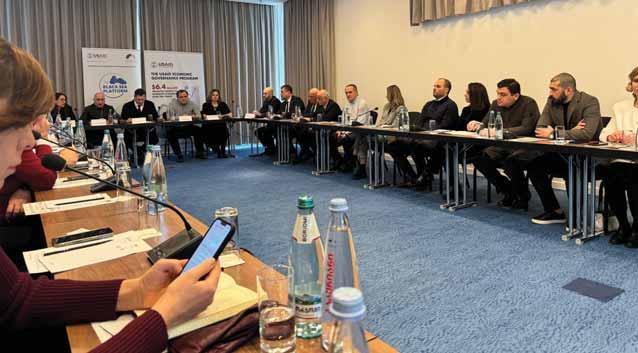
Consider that strong civil society is at the core of modern democratic and pluralistic state. CSOs play an important role in providing much needed services to the public; they also help to improve policies in the interests of the people and are crucial for checks and balances system. We particularly note that donors, through CSOs and the state institutions, have done a tremendous job in improving infrastructure, advancing quality
education, empowering SMEs, promoting green economy as well as supporting most vulnerable segments of our population, such as women, children and persons with disabilities;
Are following with concern re-initiation of the law, titled “On transparency of foreign influence,” in the Georgian par-
liament that was withdrawn last year; Take note of the statements from our closest allies and strategic partners, as well as those of the representatives of international organizations, who have been stalwart supporters of our sovereignty and democratic transition, saying that adoption of the draft law on trans-
parency of foreign influence would be inconsistent with Georgia’s EU aspirations and will contradict efforts of strengthening the democratic institutions in Georgia.
Cannot but concur with those questioning whether ensuring transparency of CSO and media financing truly requires a special, additional registration and a separate register labeling them as an organization under foreign influence. Share concerns that the law, once implemented would stir suspicion and distrust toward these organizations and would stigmatize them, thus having a chilling effect on their activities.
Having said this, We urge the parliament to carefully weigh the impact of adoption of the draft law and refrain from the actions that will further polarize our society and undermine Georgia’s European integration prospects.
Signed:
EU Business Council
American Chamber of Commerce in Georgia
German Business Association (DWV) Chambre de Commerce et d’Industrie Francaise en Georgie Georgian Distributors Business Association (GDBA)
GEORGIA TODAY APRIL 19 - 25, 2024 8 BUSINESS
Georgian Producer’s Federation
TPU
Georgia is an Easy Place to Rent/Own Cars
Daniel Klein, legal columnist of the Georgian law firm Klein & Pantsulaia, gives some basics (legal and otherwise) about cars in Georgia. Georgia is a well-known and popular destination for digital nomads, retirees and tourists (see Legal Insights with Klein Law: Renew Georgian Visa with 1-day Departure; Re-Enter for another 365 Days). In terms of tourism, if the local AmCham of Georgia is any bellwether, of its 230 members, 34 of its members are in tourism related businesses. By comparison, in Amcham of neighboring Armenia, about 11 members are in the tourism industry (the authors of this article are members of both). Tourists are attracted by Georgia’s cuisine, wine, value for money, lodging and opportunities to visit mountains, beaches and countryside, all of which often involve car rentals.
RENTING A CAR
Renting a car in Georgia is straightforward. According to Joe Boccuzzi, an American co-owner of GSS Car Rentals, during peak seasons, you can expect to rent a car for around $50 a day. Many rental companies don’t require a multithousand dollar hold on your card; often, $200 in cash is often sufficient with private car rental firms. People often confuse International Driver's Licenses (IDL) with their regular driver's license. However, most rental companies only require your driver's license and are not interested in seeing an IDL, as it's essentially just a translation of the base license and doesn't confer any additional driving rights. Major international car rental

brands have a presence in Georgia, and most companies allow drop-off in different locations for a fee. Additionally, most car rental agencies in Tbilisi permit
renters to cross the border into Armenia, with the requirement of purchasing insurance at the Armenian border for a small sum, approximately $10.
As many renters are looking to go into rural/mountain destinations, a lot of the rental cars are off-road, or even offer rentals of tents, sleeping bags and the like to complete a wilderness adventure.
BUYING/SELLING CARSNEW CARS AND EVS
Many of the big Western brands do have showrooms in Georgia, but not every brand has a Georgian presence. So those with specific brand loyalty might have no choice but to opt for used.
As with many countries, EV ownership is booming. E-Motors Georgia is one of the recent car salons to enter the market, with an exclusive dealer arrangement with seven Chinese brands, with some having up to eight-year warranties.
According to E-Motors Georgia’s Leri Shafta, E-Motors Georgia has cars starting at $10K, one of the top cars, the IM Motors I7, features 23 cameras and 22 sensors, double or more of any Telsa.
BUYING/SELLING CARS - USED CARS
Foreigners are permitted to own automobiles in Georgia. The main platform for purchasing cars is myauto.ge, or the large open-air used car market in Rustavi, near Tbilisi. When buying from this market, cars are typically sold on the spot, so it's advisable to bring along your own mechanic for inspection. If possible, Mr. Boccuzzi suggests bringing the used car to a reputable car mechanic shop if possible, such as tuzmotors.ge, for inspection. Many used cars in Georgia were originally purchased at auto auctions in the USA, so it's wise to check the car's history using the VIN number. This can
be done through a US VIN verification website for about $45, or through a Georgian site for a little over $10. The used car market for popular brands is quite active and fluid, so selling a correctlypriced car usually doesn’t take much time. Repairing cars in Georgia is costeffective due to markedly lower labor costs. There's a mini-industry of importing, fixing, and reselling cars, so minor damages are not a cause for concern.
CAR REGISTRATION
Registering a car in Georgia is quick and easy, similar to real estate transactions in Georgia, which is also extremely user friendly and instantaneous.
AUTO THEFT RATES
Georgia boasts low auto theft rates, ranking as the 3rd safest country worldwide according to numbeo.com. Despite any lingering reputation from the 1990s, Georgia remains one of the safest cities by all measures, particularly due to the rarity of firearms (US: 1.2 per person; GE .1 per person; France & Germany: .2; Canada: .35). Full insurance is always recommended, though, regardless of the low auto theft rates.
This article was prepared by Klein & Pantsulaia, the only foreign-owned firm in Georgia.

Reading in Our Time of “No Time”
Using the plain language of statistics, more than two million books go into print annually in the world. Based on the publicly available UNESCO data, there are conceivably 160 million books on the planet today. It is thought that a voracious bibliophile can digest an average of approximately 150 books a year, this figure probably true if that avid book-lover has a lot of leisure time to use on reading. A reader endowed with a medium reading appetite would possibly read far less than 100 books a year, and a lazy bookworm would perhaps do with only 30 books a year, in the best-case scenario. There are some people with catastrophically low reading ratings, at only 10 books per annum, if any at all. These figures cannot be ideally accurate to describe the reading situation around the globe, but they at least give us some measure of perception of the current human ability to muster the available monster-size reading matter, consumed in accordance with individual demands and necessities in general.
That bunch of 160 million books should be interesting and useful enough to read, each one in its own way, their proud authors, both in the past and now, sure that their precious creations deserve our attention.
So, what to read and how to manage wise, rational selection? There are hun-
dreds of tips and guidelines in libraries, on bookstore shelves, and online, but they do not cater to all our reading desires and exigencies. As a matter of fact, reading per se has turned into an existential dilemma for us, we humans whose inevitable lot is to live and work in this egregiously accelerated age.
In the current super-busy life tempo, the rhythm of our existence is excruciating, wrought with a thousand errands and obligations, educational pressures and labor requirements for our daily bread, to ensure our health. Then there’s TV attachment and Internet lure, everyday routine and inevitable nights of sleep all getting in the way. Time has to be carved out for reading- carved out of something, somewhere and somehow, in the midst of this modern hustle and bustle.
It goes without saying that we can’t do without a due portion of reading in our lives, but reading cannot be done without a strict, preconceived, rational plan, one that works on forming a productive and happily functioning person. Reading is a real powerhouse for building a better personality with an elevated sense of empathy and tolerance; it makes us more attractive as human beings; it improves our memory and the ability to reason; and it develops our creative thinking. But just being conscious of all those advantages of reading is not enough:
Reading is a lifetime process which needs to be organized so optimally that we are not distracted from doing substantial things for our survival, including all the essential prerequisites to turn ourselves from a child into an independent adult.

One of the tools for this is teaching children what to read, when and why, being conscious that there is only a certain number of books that we are capable of reading in our lifetime. Take, for instance the kids of Sakartvelo: they have to know the widely represented prose and poetry which was created in their native tongue so that they can function successfully in this culture. They also have to be versed in foreign literature (foreign meaning the literature of tens, if not hundreds, of other peoples and
cultures around the Earth) to sound civilized and to be efficient in the international arena. What matters most when we are faced with our reading needs is that survival asks for deep knowledge of a specific field of human activity, one which molds a money-generating specialist, compatible with public demand. To achieve the relevant level of that professional skill, one has to go through a definite number of special books to turn us into those future useful workers. The reading in
our time of time-shortage is a real problem and needs extremely astute handling. Otherwise, life will fly by, leaving us too empty-handed and empty-minded to face the elements that life prepares us to experience.
Let’s in the first place teach our young what to make out of the millions of books that are scattered around, enticing them to embrace them. Our children have no clue what to do with that frightening avalanche of information, and they need our help!
GEORGIA TODAY APRIL 19 - 25, 2024 9 BUSINESS
Image source: Bianca Bagnarelli
BLOG BY NUGZAR B. RUHADZE
SOCIETY
Gareji? Vardzia?
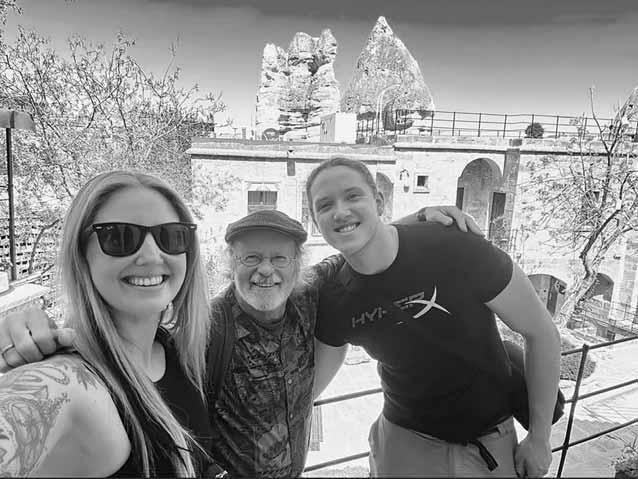
These were the locations pushing and pulling me as various forms of transport took me towards a reunion with my niece and her son in Cappadocia, Turkey, this week.
After crossing the border at Sarai, just past Batumi, I had a long minibus run along the Black Sea coast. Nothing too dramatic there: The sea was calm, the weather sunny but not yet too hot. All the way to Trabzond. Its monastery will have to wait for a special trip; I had a lot farther to go yet.
We began heading south while also continuing west, and the landscape began to reveal more of itself. This was definitely Vardzia country, in a long rocky valley very much reminiscent of that famous Georgian cave city and its surroundings. The highways in Turkey never fail to impress me, and this one was no exception; I look forward to seeing the full opening of Georgia's own 60km Rikoti Pass engineering marvel this autumn, as planned. No more bottlenecks, please.
I couldn’t make it all the way to Cappadocia without arriving after midnight, so I spent a comfortable night in a Ram-
ada hotel in Sivas, capital of the former Armenian part of what is now Turkey. Again, I could have found much of interest here to discover, but couldn’t let it distract me. There was a bigger goal coming closer.
Finally, to Goreme, in the heart of Cappadocia, in time to knock on my relatives’ hotel door and have lunch together. Since then it’s been a whirlwind of exploring this fascinating sculpture of a landscape together with them, whom I haven’t seen for nearly five years. The young man is just about to graduate from high school, and this could be seen as part of his less formal but no less important education. We took a horse ride in a small group up to a wonderful viewpoint overlooking all the spectacular sandstone formations and “fairy chimneys” the region is famous for. On the horse, I instantly discovered that, even while just walking, it was impossible to use the long lens I had on my camera. So I had to swap lenses while in motion; but I have done this before, so there were no mishaps with dropping any precious gear. I stuck to recording some videos with my phone instead, until we dismounted at the viewpoint. It hardly felt like we were still on earth. This landscape is simply unique. I had already seen it at sunrise, by hot air balloon, a few years ago; but then there wasn’t enough time to just walk, stop,
look, live among these rock marvels for a few days.
We have also gone on a day tour, which included a river valley walk; a 12th century church and next to it a linseed oil pressing factory of similar age; stops at a jewelry production showcasing the new gemstone sultanate which changes its color under different lights and is only found in one location in Turkey, nowhere else on earth; a leather fashion show and shop where I finally found a belt which actually fits me; and a spice bazaar full of Turkish deliciousnesses.
The tour agency felizturismo.com, and its excellent host, Huseyn, did a superb job of keeping us interested with his great knowledge of our surroundings. Today, more of a rest day after all that activity, although I do plan to return to nearby Ortahisar and its little Church of St. Nino, this time to video the place. Apparently Georgia’s most famous saint, who brought Christianity to the royal family in Mtskheta early in the 4th century, was born here, as I have written before.
Balloon rides have more than doubled in price since my wife and I paid $100 each for the pleasure; and it’s not yet clear whether wind conditions will allow flights while we are here, a day-to-day announcement which can change quickly. Even seeing the whole crowd of the


things rising from the ground, this time, will be enough. My last set of photos from the initial flight gives up to 80 of them together in a few different frames, really quite a show.
Most important of all, however, has been these days catching up with family post-Covid. We treasure these times together, in this increasingly uncertain world. Georgia’s own dramatic news of the last few days, I have only been able to watch from this distance.
Next stop: Meeting my wife in Amster-
dam. From three dimensions down to almost two…but much there to see, too.
Tony Hanmer has lived in Georgia since 1999, in Svaneti since 2007, and been a weekly writer and photographer for GT since early 2011. He runs the “Svaneti Renaissance” Facebook group, now with over 2000 members, at www.facebook.com/groups/ SvanetiRenaissance/ He and his wife also run their own guest house in Etseri: www.facebook.com/hanmer.house.svaneti


GEORGIA TODAY APRIL 19 - 25, 2024 10 SOCIETY
BLOG BY TONY HANMER
Killages – A Georgian Band All Set for International Success
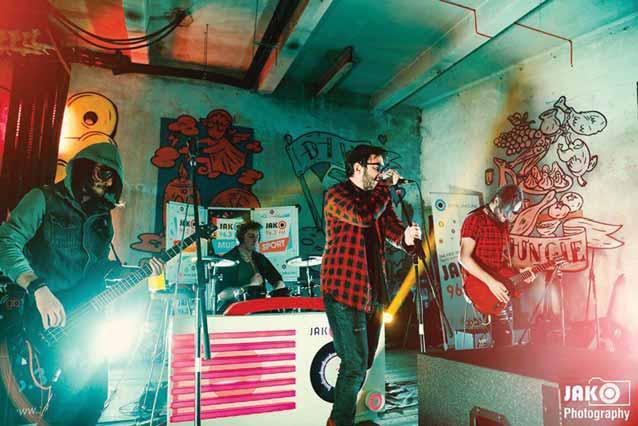
Killages, a trio hailing from Georgia, consists of Guga Macharashvili (vocals, songwriter), Rati Ratiani (drums, producer), and Anri Kavelashvili (guitar, producer). Their journey began in late 2016, in Rustavi, when Guga and Anri, unsatisfied with their previous musical project, sought a fresh start. Joining forces with Rati and Lippo, they transformed into a quartet, birthing Killages.
They quickly gained recognition by winning the national battle-of-the-bands competition, ‘Newcomer 2017.’ Their eclectic sound, blending rock, pop, indie, funk, and hip-hop, resonated with audiences, while early hits like ‘ON/OFF’ and ‘Run’ amassed millions of YouTube streams, propelling them beyond Georgia's borders. In 2020, their crowdfunded album ‘Original Brothers,’ paying tribute to friends, success, and their city, earned them a nomination for Track of the Year at Electronauts for the track 'Bottle SIP.'
Part of Georgia's burgeoning music scene, Killages embraces Western influences and English lyrics, as they aim for global recognition. But they also occa-
sionally infuse Georgian into their songs, keeping some authenticity and accessibility for local fans. Their name, a fusion of "kill" and "ages," symbolizes their mission to fight boredom and defy aging. “We just want to feel young, even when we’re old,” they say.
With a following that is already expanding beyond Georgia, Killages creates music that defies categorization, blending genres and freely experimenting with new sounds. “Our sound is sometimes melancholic, sometimes aggressive, energetic, or melodic. We don’t like to put ourselves in any one box,” Guga told WePreserve in a 2021 interview.
Killages' live performances, their dynamic stage presence and engaging background visuals, are captivating ever larger audiences of all ages. And successfully featuring as 2023’s support band for the Imagine Dragon’s concert in Tbilisi foreshadows a promising future for them on the global stage. With this in mind, GEORGIA TODAY got in touch with them to find out more.
WHAT INSPIRES YOU WHEN YOU'RE CREATING YOUR MUSIC? WHO ARE YOUR INFLUENCES?
Killages stands for a love of music, and we adore the process of creating it. Our favorite musicians count 21 Pilots, Kendrick Lamar, Brockhampton and Isaiah Rashad, whose music is also a dynamic synthesis of genres. We love to experiment and give listeners a unique experience. Our goal is to break down musical barriers and inspire people by doing so.
HOW DO YOU COME UP WITH YOUR SONG LYRICS?
Guga: When writing lyrics, I’m looking into my deepest emotions, and though I often find it difficult to express these feelings in public, music and melody help. We also occasionally express our opinions on current events in our country through music. I love to play with words, and all my rhymes are representative of Killages' musical world.

HOW HAS YOUR POPULARITY GROWN? TELL US SOMETHING ABOUT YOUR FANS.
The popularity of Killages has grown rapidly, thanks to both us and our managers from Bloom Music. In the last three years, our number of listeners has tripled, as has the demand for new songs. After our concerts, we love getting off the stage and spending time with our fans. It’s a real motivation in itself. Alongside our teen following, we also have a relatively older generation of supporters. It’s an amazing journey and we’re grateful to all those on that journey with us.
WHAT CHALLENGES HAVE YOU FACED ON YOUR WAY? HOW HAVE YOU OVERCOME THEM?
Killages has survived several critical moments. There was a time we almost disbanded because we thought our songs couldn’t reach people. Just at that moment, Tevodore Makashvili, our current manager, came into our lives, and with his help, our relationship with potential customers improved, as did the number of concerts we were heading. There are still challenges, but now this just motivates us to work harder. We’re ready for everything life throws at us on our way forward.
The most incredible moment was our performance of ‘Isev,’ with 30,000 people singing along
ests us, at this stage we have other priorities. When we overcome the current challenges, we’ll start preparing for a live album as well.
WHAT ARE YOUR AMBITIONS?
Our main goal is to increase our number of listeners and enter the international market, both in Europe and America. The goal is a big one, but we’re ready to do whatever it takes to get there.
Our goal is a big one, but we’re ready to whateverdo it takes to get there

TELL US HOW IT FELT TO OPEN FOR IMAGINE DRAGONS IN TBILISI LAST AUGUST. We couldn't believe it when we got the opportunity to open for one of the biggest bands in the world. The most incredible moment was our performance of ‘Isev’ (Again) with 30,000 people singing along! Thanks to everyone who gave us the chance to experience it!
WHICH WOULD YOU NAME AS YOUR MOST POWERFUL AND POPULAR SONG(S)? ON/OFF can be considered our most successful single, according to the statistics it has on Youtube and Spotify, but there are many other songs in our catalog that are very popular with listeners and carry a special meaning for us. Every song carries a different charge, especially when performed live.
YOUR LIVE PERFORMANCES HAVE A SLOWER AND DEEPER SOUND THAN YOUR PUBLISHED MUSIC – HAVE YOU CONSIDERED RELEASING A LIVE ALBUM?
As much as releasing a live album inter-
HOW DOES A GEORGIAN BAND BREAK INTO THE INTERNATIONAL SCENE?
A considerable part of our current audience is located outside the borders of the country. We want to grow this fan group through concerts in other countries, and by collaborating with artists from other countries - this is something we’re actively working on. We hope our goals will become a reality in the near future.
WHEN PERFORMING ABROAD, IS IT IMPORTANT FOR YOU THAT PEOPLE KNOW YOU ARE GEORGIAN, FROM GEORGIA?
The fact that we are from Georgia is certainly important for us. Capturing this also gives our music a unique dimension. We think that the context, the environment in which the music is created, is an important element for the listener as well - the beauty of music is hidden in its richness and diversity.
Killages will be opening for Akon on May 23 in Tbilisi, will play open air at Rooster’s in DedaEna Park on June 8, and we believe many more bookings are to come!
GEORGIA TODAY APRIL 19 - 25, 2024 11 CULTURE GEORGIA TODAY PUBLISHER & GM George Sharashidze COMMERCIAL DEPARTMENT Commercial Director: Iva Merabishvili Marketing Manager: Natalia Chikvaidze EDITORIAL DEPARTMENT: Editor-In-Chief: Katie Ruth Davies Journalists: Ana Dumbadze, Vazha Tavberidze, Tony Hanmer, Nugzar B. Ruhadze, Mariam Mtivlishvili, Erekle Poladishvili, Shelbi R. Ankiewicz Photographer: Aleksei Serov Website Editor: Katie Ruth Davies Layout: Misha Mchedlishvili Webmaster: Sergey Gevenov Circulation Managers: David Kerdikashvili, David Djandjgava ADDRESS 1 Melikishvili Str. Tbilisi, 0179, Georgia Tel.: +995 32 229 59 19 E: info@georgiatoday.ge F: GeorgiaToday ADVERTISING & SUBSCRIPTION +995 555 00 14 46 E-mail: marketing@georgiatoday.ge Reproducing material, photos and advertisements without prior editorial permission is strictly forbidden. The author is responsible for all material. Rights of authors are preserved. The newspaper is registered in Mtatsminda district court. Reg. # 06/4-309
INTERVIEW BY KATIE RUTH DAVIES
* *
*










 BY TEAM
BY TEAM












 BY SHELBI R. ANKIEWICZ
BY SHELBI R. ANKIEWICZ















